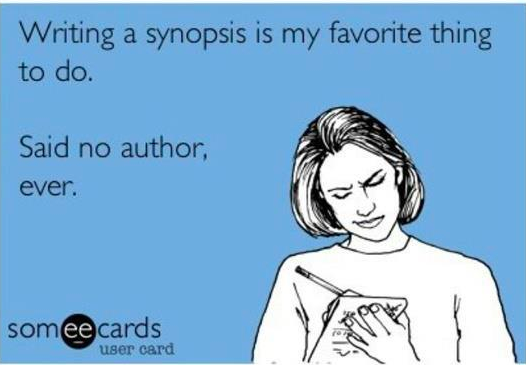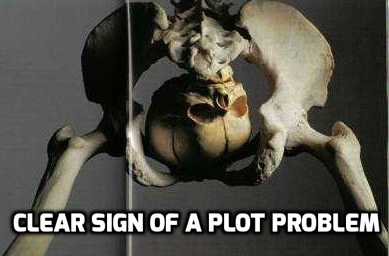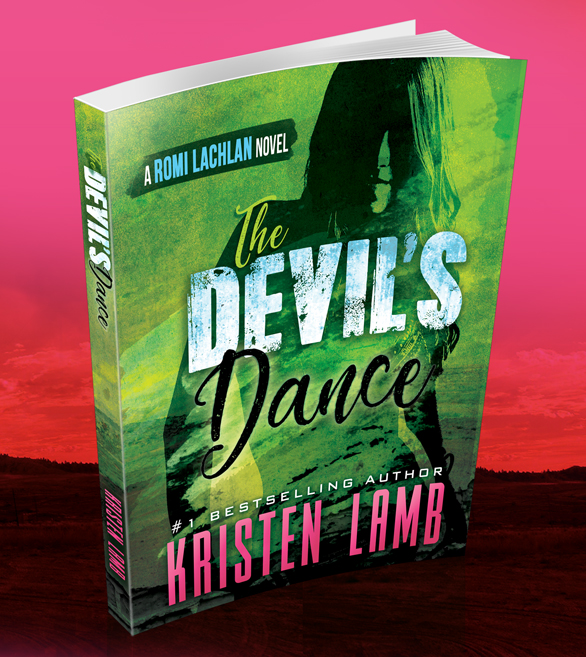
There is one word known to strike fear into the hearts of most writers. Synopsis. Many of us would rather perform brain surgery from space using a lemon zester and a squirrel than be forced to boil down our entire novel into one page.
Yes one.
But alas we need a synopsis for numerous reasons. First and foremost, if we want to land an agent, it works in our favor to already have a FABULOUS synopsis handy because the odds are, at some point, the agent will request one.
Sigh. I know. Sorry.
A Quick Aside
When it comes to synopses, I lean toward the, ‘Better to beg forgiveness than to ask permission’ camp. This is where already having a seriously spiffy synopsis helps.
Think of it this way. E-mail is necessary, but also tedious. Getting lots of email and having to juggle it all, frankly, sucks. Agents get a lot of email. Since I’m also a person who gets a ridiculous amount of email, I LOVE people who save me work. They save me time when they save needless steps.
Most queries these days are via email and since agents don’t like getting their computers crashed by a virus? This means the query will be pasted into the body of the email (no attachments).
Believe it or not, agents like writers. In fact they need writers. They don’t get paid without a writer (who has a book). Last I checked, agents also really like being paid in money—not adorable pigmy goats. Trust me, you will only make THAT mistake once.
To Boldly Go…
So we are clear, agents need writers. Their goal is to make the authors they represent as successful as possible. When the author wins, so does the agent. This is why they’re very picky who they add to their cadre. Just as much as agents are looking for reasons NOT to read our book, they’re simultaneously looking for reasons TO read our book.
I know it’s a paradox much like time travel. Don’t think about it too long or your brain will cramp.
In my opinion, there’s nothing wrong with ending your query with: I have taken the liberty of pasting the one page synopsis of my novel below for your convenience.
Worst case scenario? They don’t scroll down. OMG!
But best case is they DO scroll down and they like it! Better yet, you are off to an awesome start because you just saved them a crap-ton of time. Proper initiative is a great way for us (the writers) to make a good impression. Yes, agents want to discover that fabulous book, but it’s even better if that fabulous book comes with an author who makes their life/job easier.
Why Do We Need a Synopsis?

If you don’t want to automatically include the synopsis that’s fine, but if you write a really good one (which IS possible if the story is strong)? Why the heck not?
All right, so what if you aren’t brave enough to include a synopsis and are praying that the subject never comes up and the agent skips all this and asks for a full. Okay, great! Problem is, if you do get a book deal, often the editor will want you to write a synopsis for the book you’re writing next (for approval of course).
Ugh, so if you go traditional, really no dodging it.
Some of you might be saying, Oh, but Kristen! Traditional is sooo yesterday and I am self-publishing. I don’t need a synopsis.
Technically correct, but actually I do recommend a synopsis for all the reasons writers loathe writing them.
Why All the Angst?

Dramatization of writers off to work on a synopsis.
A big reason writers hate writing synopses with the power of a thousand suns is because we believe every word is precious and every character vital and necessary. We lack perspective, especially if we haven’t had any time or distance away from the work.
This is normal.
But a bigger reason many writers hate writing the synopsis (particularly for first-time novels) is the synopsis makes it painfully obvious we have no story or a terribly flawed story.
The synopsis strips away our pretty prose and all our verbal glitter and it lays our story bare.
Today I want to talk about the BIG PICTURE stuff. What is it our synopsis is really out to reveal? If we don’t first grasp that, no amount of tips I give for writing a great synopsis will help.
Synopsis as Skeleton
The synopsis is the skeleton of our story. What do skeletons do? They support everything else. The skeleton is the guidepost for all that is to come.
We can see the skeleton of a fish and ‘see’ the fish even without benefit of gills and scales. We can see an elephant skeleton and get an idea of scope and size and finished ‘entity/product.’
But most importantly, we don’t have to be a doctor to look at a skeleton and tell that something is horribly wrong.

Image via Wikimedia Commons.
We don’t need a lot of imagination to see how this skeleton above is going to flesh out, pardon the pun. We can see at a glance that this human skeleton is going to have a lot of problems because of the various deformities.
The same holds true with a story skeleton. If the narrative orbital sockets are located in the posterior, we don’t care how pretty the eyes are if they are in the @$$.

There is no amount of witty dialogue or clever prose that is going to rescue a plot that is missing vital parts or has them in the wrong place.
Yes, we are sending a synopsis in hopes of selling a story, but how is the synopsis doing this? Plain and simple? The synopsis is letting the agent see if the skeleton is solid, symmetrical and is of a creature that is rare, cool and maybe never seen before.

Image via Flikr Creative Commons, courtesy of Steve Starer.
An agent is also looking at a synopsis because she knows it is the fastest way to reveal terminal (deal-breaker) errors.
***For the self-published folks. Technically you don’t need to write a synopsis, but if you can’t for any of these reasons below, the novel might not yet be good to go and this could save a bunch of nasty reviews.
Is the premise weak?
I get pages all the time from ‘finished novels’ but there actually is no story. Just because we have 80,000-100,000 words doesn’t mean we have a story. It means we have a lot of WORDS.
Is it really a novel or just melodrama?
Do we have a solid plot or is it ‘scene’ after ‘scene’ of bad situations?
Does the ‘plot’ rely on trickery? Gimmick?
Often writers are having a panic attack about writing the synopsis because the entire book rests on a ‘clever’ twist ending that really isn’t a twist but rather a gimmick.
I.e. It was all really a bad dream.
No.
Does it require deus ex machina to resolve?
The protagonist endures plight after plight and all seems lost when she finds…………a journal!
No.
Does it actually resolve?
New writers often don’t understand structure, which naturally means they don’t yet understand that series follow similar structure guidelines to a singular novel.
***And btw, it is OKAY to be new, so breathe!
Even series still follow three act structure. But say the story follows four or even five act structure. Doesn’t matter. The story is not over until the core story problem introduced in the beginning is resolved.
Every book in a series must read as a standalone. Readers should be able to pick up Book 5 in a series and enjoy a complete story and understand what’s going on without having yet read Books 1-4.
If Book 5 blows the reader away, she’ll want to go read Books 1-4. However, if Book 5 makes no sense at all without first reading Books 1-4? We’ll pass.
We read for entertainment, not extra homework.
NO BATMAN ENDINGS.
Stay tuned for next week book!
Often I get, Oh well the reader will have to read the next book to know if she lives. Nope, not how that works unless we write for Days of Our Lives.
No matter the structure we use, our story must come equipped with a satisfying resolution, or that story is missing legs.
In the case of a connected series, often a gatekeeper to the Big Boss is defeated but the journey continues toward that final showdown. No being clever by withholding a resolution.
Is the writer breaking genre constrictions in unforgivable ways?
For instance, romance comes with an HEA (happily ever after) or the more modern HFN (happily for now). No HEA/HFN? It ain’t romance.
If the author is selling the manuscript as romance in the query, but the story ends in a breakup? The agent knows this is a new writer who doesn’t understand genres have rules and expectations.
Is the story just not all that remarkable?
Once the plot is laid bare, is it truly anything unique? A fresh twist on an old idea? Or is it really more of the same?
My book is about a thirty-eight-year-old female executive who decides she wants to have a baby and the struggle of being an older mom.
Okay *falls asleep*.
My book is about a thirty-eight-year-old female executive who finds out she’s pregnant with her first child at the same time her teenage stepdaughter reveals she, too is expecting.
*perks up* Hmmm, interesting.
The Good News
When we can write a concise and interesting synopsis, it shows our level of skill and the strength of our story. If we can write tight and clean here, it bodes well for the book. If your brain is in knots writing your synopsis, relax.
If the story is there the synopsis is too. It’s only a matter of unearthing it.
I love hearing from you!
(And am not above bribery.)
What are your thoughts? Have you been struggling with the synopsis and think it’s because there might be bigger issues going on? Are you a more seasoned writer and remember the nightmare of trying to fit a first-time “novel” into a single page? Any thoughts? Questions? Suggestions?
What do you WIN? For the month of April, for everyone who leaves a comment, I will put your name in a hat. If you comment and link back to my blog on your blog, you get your name in the hat twice. What do you win? The unvarnished truth from yours truly. I will pick a winner once a month and it will be a critique of the first 20 pages of your novel, or your query letter, or your synopsis (5 pages or less).
Heads Up! If you need help, on May 3rd 7-9 EST I’m teaching Pitch Perfect—How to Write a Query Letter & Synopsis that SELLS.
****Free recordings are included with all classes.
You’ve written a novel and now are faced with the two most terrifying challenges all writers face. The query and the synopsis.
Query letters can be daunting. How do you sell yourself? Your work? How can you stand apart without including glitter in your letter?
***NOTE: DO NOT PUT GLITTER IN YOUR QUERY.
Good question. We will cover that and more!
But sometimes the query is not enough.
Most writers would rather cut their wrists with a spork than be forced to write the dreaded…synopsis. Yet, after reading this post, you now know why this is a valuable skills all writers should learn.
Also NOW OFFERING…
 The first five pages are the most essential part of the novel, your single most powerful selling tool. It’s how you will hook agents, editors and readers. This class will cover the most common blunders and also teach you how to hook hard and hook early. This class is two hours long, 90 minutes of instruction and 30 minutes for Q&A.
The first five pages are the most essential part of the novel, your single most powerful selling tool. It’s how you will hook agents, editors and readers. This class will cover the most common blunders and also teach you how to hook hard and hook early. This class is two hours long, 90 minutes of instruction and 30 minutes for Q&A.
***A free recording is included with purchase.
General Admission is $40 and there are some SUPER COOL upgrades! Get your spot HERE.
MORE CLASSES!
Ready for Book Beast Mode? I Live to Serve…Up Some TRAINING!
For anyone who longs to accelerate their plot skills, I recommend:
ON DEMAND Plot Boss: Writing Novels Readers Want to BUY.
Two hours of intensive plot training from MOI…delivered right to your computer to watch as much as you like 😀 .
The Art of Character is also now available for ON DEMAND.
And if you’re ready for BOOK BEAST MODE and like saving some cash, you can get BOTH Plot Boss and Art of Character in the…
Story Boss Bundle (ON DEMAND).
Almost FIVE HOURS with me, in your home…lecturing you. It’ll be FUN!
I also hope you’ll pick up a copy of my debut novel The Devil’s Dance.










20 comments
2 pings
Skip to comment form
I understand what one is, but there are conflicting opinions of what should be in one! ARGH!
Regarding the noted about resolutions, I read Ghost Road Blues by Jonathan Maberry, a horror series about a purportedly acclaimed author. That book is NOT a stand alone. It actually ended when all the characters were set in motion, almost like a first plot point. I don’t understand why that was deemed okay. I really don’t. So that point really hit home. I mean, every Harry Potter book ends neatly without resolving the big issue of Voldemort. Anyway, love taking notes on these topics. So much to learn as a noob.
Author
In a series there is the GRAND problem (Voldemort, Sauron, etc.) but each book has a SPECIFIC problem (core issue) to be resolved to ‘level up’ so to speak. It’s like a Things To Do list increasing in intensity and difficulty. Collectively they resolve the BIG PICTURE problem.
In Lord of the Rings, same thing. Book One, core problem is figure out if that IS the Ring of Power and get to Rivendale to seek council from elves and see if Sauron is back and make a plan what to do. Resolution is creating the fellowship and the party is split (battle the Uruk-Hai). Book Two is the Fellowship of the Ring (fragmented but fighting in different war theaters). They now recognize there is a larger war machine now come to life. Goal is to get the word out so Middle Earth working in an alliance against the impending onslaught. Big Boss is Sauroman (good guy turned bad). He has to be defeated. Book three ‘Return of the King’ is Aragorn righting the wrongs of his father and fending off Sauron’s forces, holding the line long enough for Samwise and Frodo to destroy the Ring of Power.
Three boss battles of increasing difficulty Uruk-Hai–> Sauroman–> Sauron. Each book, however, has a complete three act arc and a core problem which is resolved (and which is vital for resolving the overarching threat—Sauron). Alas, place all three books together and again, you will see three-act structure. I imagine if we lined up all the Harry Potter books we’d see a similar phenomena.
What exactly is the difference between an elevator pitch and a synopsis? My understanding is the same difference between a tweet and a facebook post, perhaps? They’re both social media, but one only grants you a tiny space and the other is more flexible (and while it can be really, really long…it shouldn’t be, and people probably won’t read it if it is.) But…am I misunderstanding?
Author
A synopsis tells entire story and is the skeleton of the whole novel. A pitch is a hook for interest but doesn’t lay out the bones of the entire story.
An “elevator pitch” — also known as a logline — conveys the protagonist, antagonist, conflict/stakes, setting, and tone/genre — all in one concise sentence (two tops). Learning to compose those is an art unto itself…
I agree that each book in a series should have its own arc, absolutely. We want some kind of resolution.
However, I’m not sure that means at the same time that it must work as a standalone. There are plenty of books in series that have resolution within them, but you would never read them as a standalone because the overarching story or number of characters is so significant the book doesn’t make much sense unless you read the whole series. I’m thinking of the likes of Robert Jordan’s Wheel of Time or Game of Thrones (and the negative reaction from some people to Feast of Crows/Dance with Dragons being split does prove your point because they should have been a single book).
I think it’s necessary to distinguish between series like GOT, LOTR, Robert Jordan’s Wheel of Time and series which just have a repeating character, like the Sherlock Holmes stories.
I remember as a child picking up David Eddings’ Belgariad series. It was from the local library and I had to start at Book 2 as there was no Book 1. It was immensely frustrating not to have read the first one, even though he helped me out a bit by restating some key plot elements (as Jordan always does in WOT).
In today’s Internet age, and with money at my disposal, I would never even consider starting a fantasy series midway through. It just seems daft.
Author
When I say can be read as a standalone, I don’t mean that we would. We would WANT the entire series if connected because of the larger problem. I mean standalone in that the particular problem introduced in the Inciting Incident is resolved by the end. It isn’t a collection of vignettes and we need three or five or ten books for any resolution.
Yup. If there are major problems in you synopsis, check the story. The synopsis is probably not the problem. When I was doing one for my cowritten thriller, the synopsis showed that we had given main character status to too many people. It was four, and we literally could not synopsize the story without LYING to leave characters out. It was back to the drawing board, eventually anyway, once we were willing to take it out of submission.
That was one of hardest things in critiquing the synopsis on one the writing message board. Because of my experience, I could plainly see the problem, that it was the story, not the synopsis. But tell the writer eager to send it off to agents…no. They wouldn’t have wanted to hear they needed to toss their book and start again.
Hmmm. Been struggling trying to get my next round of edits in for Beta reading and have lost the will to edit. Maybe I need a synopsis to help me reframe what’s really important in the story… for myself.
Also, do you have any tips one what one looks like?
Author
Here is a post that can help get you started. Once you have that one sentence, work from that. A sentence for each major plot point the name of main characters in ALL CAPS first time introduced.
Amazon’s KDP and Smashword’s self-publishing tools both require a synopis when submitting a manuscript for publication. I hate to do it sooooooo much but I do it anyhow. There’s no escape from it. As for writing a “spiffy synopsis” in 1000 words or less how the f__k is that done?
I was happy to hear that other authors hate it as much as I do.
any book can be boiled down to 3 sentences or one compound sentence AKA, the elevator pitch. The trick is in the bones and not in the flesh.
I actually quite like writing synopses. (Am I a freak? Quite possibly.) It’s writing the entire rest of the novel that’s exhausting!
Learning to strip down the novel to it’s bones is definitely a skill. Getting the right stuff in there and leaving the other stuff out–yeah the cat picture!
If it’s a novel I start with the resolution. No, that’s wrong, I start with a character who is going to have to deal with extraordinary circumstances. I introduce events are likely to flow naturally from the story and setting, and ultimately – following Aristotle’s archaic but still sound advice – aim for a resolution that fits with the world created.
The synopsis flows from the events but, invariably, the writing process demands examination of more abstract matters – why write if you’ve nothing to say? The synopsis is the prompt to have an eye on the work as a whole, under the principle of ‘prune message in favour of action’.
A synopsis is definitely a great test for any story. I’ve heard a fair number pitch that it’s a good way to test an idea, if you can’t identify the main pillars of the story before writing a rough draft, are you really ready to write the rough draft?
Of course some do like to discover their story during the rough draft process, and that’s fine, but I like to have at least a rough outline, something to start with and react to.
I like to practice by analyzing and writing a synopsis of published novels, and use that as a foundation for writing a review.
If you write the synopses before you write the book it’s a handy guide that keeps you from wondering. Use it as a basic tool to plan and plot with. If the story changes because you improved it, then it’s easy to modify the synopses. A horse can’t pull a wagon without structure;what will the wheels attach to? Don’t drag a ramshackle box along, make the thing roll.Get the parts together and put them in order and then you’ll have a working synopses. A shorter synopses also makes a great back cover blurb to entice readers.
Hummm.. An elvin woman working for the Elder addpats needs to bring the god Unnamed bound in the Book of Pordicion back to Dentree to be destroyed.
Is that a synopsis or the pitch? Urrg.
[…] synopsis is a chore most writers dread. Kristen Lamb explains why every writer needs a synopsis, and Glen C. Strathy kicks in his tips on how to write a […]
[…] Synopsis: Why All Writers Need One Even Though They Hate It […]